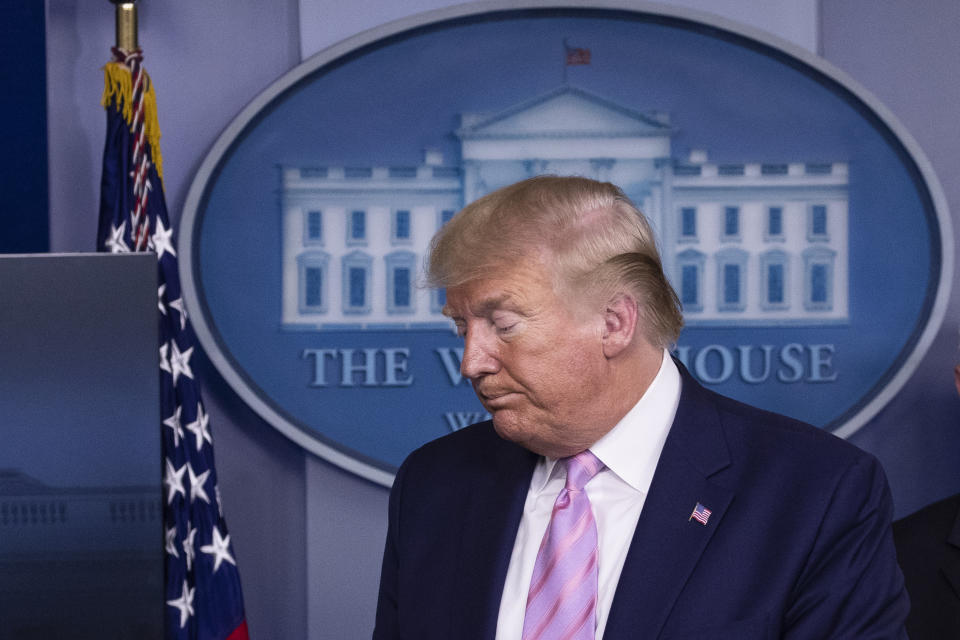A national lockdown to stop coronavirus? Trump is 'thinking about doing that'
President Trump shied away Wednesday from issuing domestic travel restrictions or a national lockdown to slow the spread of the coronavirus pandemic that, in a best-case scenario, is expected to kill between 100,000 and 240,000 Americans.
Asked at a White House briefing if he was considering limiting domestic air travel, Trump said he was thinking about it, a phrase he frequently applies to subjects he wishes to avoid discussing.
“We’re thinking about doing that, but at the same time we just, to start these airlines and to start this whole thing over again is very tough, John [Roberts, Fox News reporter]. It’s very tough,” Trump said. “And you have them going, in some cases, from hot spot to hot spot, if you noticed. Usually they’re hot spot to hot spot, very few flights, New York to Miami. But we’re certainly looking at it, but once you do that, you really are clamping down an industry that is desperately needed.”
The president did not rule out instituting further travel bans, saying it was “a calculation that we’re looking at right now and we’re looking at it very strongly,” but he began his briefing indicating that the peak of the outbreak in the U.S. might soon be at hand.
“We’re going to have a couple of weeks starting pretty much now, but especially a few days from now, that are going to be horrific,” Trump said.
Asked why he had not issued a nationwide stay-at-home order to slow transmission of the virus, Trump pointed to Florida Gov. Ron DeSantis’s order on Wednesday for state residents there to shelter in place.
“States are different and I understand that the governor of Florida, great governor, Ron DeSantis, issued one today and that’s good, that’s great,” Trump said. “But there are some states that are different. There are some states that don’t have much of a problem, well, they don’t have the problem, they don’t have thousands of people that are positive or thousands of people that think they might have it, or hundreds of people in some cases.”
DeSantis has come under fire by critics who accuse him of being slow to close beaches and order social distancing directives while the number of COVID-19 cases rose to nearly 8,000 in the state. There have so far been 101 deaths there from the disease.

But Trump continued to make his case that the ultimate call about whether to limit freedom of movement was up to the states.
“You have to give a little bit of flexibility in the Midwest or Alaska, for example, doesn’t have a problem. It’s hard to say, ‘close it down,’” Trump said.
In fact, Alaska Gov. Mike Dunleavy put a stay-at-home order in place on March 28. Alaska has 133 confirmed cases of COVID-19.
Over the past few days, Trump, who had said he hoped to have the country back to normal by Easter Sunday (April 12), has reversed course and extended the government’s voluntary social distancing recommendations through the end of the month.
He said he had come to realize that COVID-19 is different than the seasonal flu.
“It is so contagious,” Trump said when asked what had stopped likening the coronavirus to flu. “Nobody has ever seen anything like this where large groups of people all of a sudden, just by being in the presence of somebody, have it. The flu has never been like that.”
The president also said that he had been approached by health professionals who recommended a nationwide lockdown to stem infections.
“The professionals came to me and say, ‘Sir, you’re going to have to shut the country down.’ I said, what does that mean?” Trump told reporters at the briefing. “They said, ‘Sir, you’re going to have to shut it down.’”
Dr. Anthony Fauci, the leading medical expert on the coronavirus task force, offered a more sobering assessment of when social distancing measures might be eased.
“I think if we get to the part of the curve that Dr. Birx showed yesterday, when it goes down to essentially no new cases, no deaths at a period of time, I think it makes sense that you’re going to have to relax social distancing,” Fauci said.
As of Wednesday evening, over 213,000 Americans had tested positive for COVID-19 and nearly 5,000 had died from it. Roughly 20 states have fewer than 1,000 confirmed cases of the disease, but that list grows shorter with nearly every passing day.
_____
Click here for the latest coronavirus news and updates. According to experts, people over 60 and those who are immunocompromised continue to be the most at risk. If you have questions, please reference the CDC and WHO’s resource guides.
Read more:

 Yahoo News
Yahoo News 


